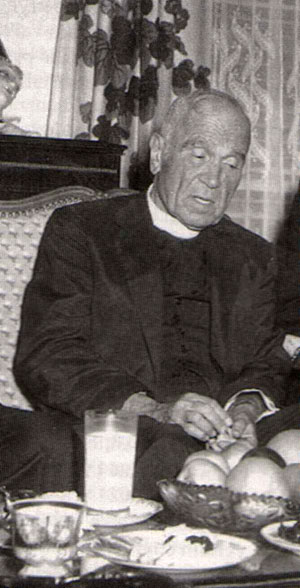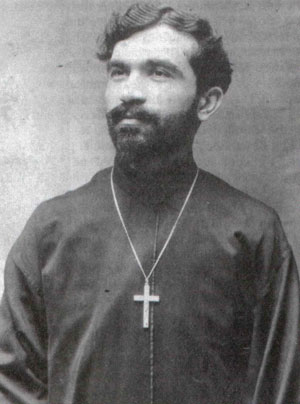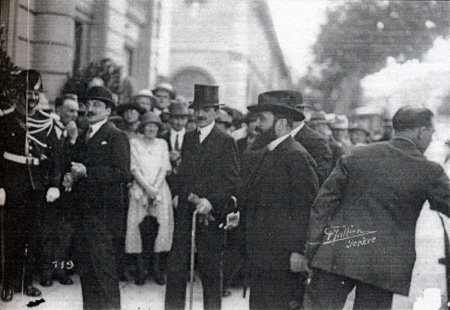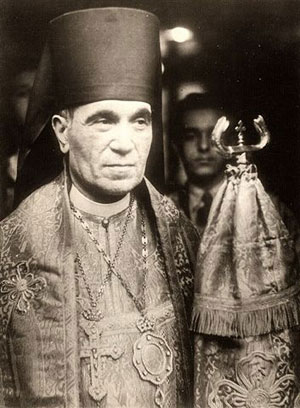
Fan Noli, 1959.
AL Voices | Robert Elsie
1962 | Fan NOLI


The present recording is a speech given Fan Noli to the Albanian-American Vatra Association in 1962.
Fan Noli (1882-1965), also known as Theophan Stylian Noli, was not only an outstanding leader of the Albanian-American community, but also a pre-eminent and multi-talented figure of Albanian literature, culture, religious life and politics. Noli was born in the village of Ibrik Tepe south of Edirne (Adrianopole) in European Turkey on 6 January 1882. His father Stylian Noli had been a noted cantor in the Orthodox church and had instilled in his son a love for Orthodox music and Byzantine tradition. Fan Noli attended the Greek secondary school in Edirne, and in 1900, after a short stay in Constantinople, settled in Athens where he managed to find occasional and badly-paying jobs as a copyist, prompter and actor. It was with one such itinerant theatre company touring Greek-speaking settlements in the eastern Mediterranean that Noli first arrived in Egypt. Abandoning the company in Alexandria, he found work from March 1903 to March 1905 as a Greek teacher and as a church cantor in Shibîn el Khôm and from March 1905 to April 1906 in El Faiyûm where a small Albanian colony had settled. Here he wrote a number of articles in Greek and translated Sami Frashëri’s Shqipëria - Ç’ka qënë, ç’është e ç’do të bëhetë? (Albanian - what was it, what is it and what will become of it?) into Greek, works which were published at the Albanian press in Sofia. In Egypt, Noli learned more about the traditions of Byzantine music which so fascinated him, from his teacher, the monk Nilos, and resolved to become an Orthodox priest himself. He also came into contact with the nationalist leaders of the Albanian community such as Spiro Dine (1846?-1922), Jani Vruho (1863-1931) and Athanas Tashko (1863-1915) who encouraged him to emigrate to America where he could make better use of his talents. The young Noli agreed.
In April 1906, with a second-class steamer ticket which was paid for by Spiro Dine, Fan Noli set off via Naples for the New World and arrived in New York on May 10. After three months in Buffalo where he worked in a lumber mill, Noli arrived in Boston. There publisher Sotir Peci (1873-1932) gave him a job at a minimal salary as deputy editor of the Boston newspaper Kombi (The Nation), where he worked until May 1907 and in which he published articles and editorials under the pseudonym Ali Baba Qyteza. These were financially and personally difficult months for Noli, who did not feel at home in America at all and seriously considered emigrating to Bucharest. Gradually, however, he found his roots in the Albanian community and on 6 January 1907 co-founded the Besa-Besën (Pledge) Society in Boston.
In this period, Orthodox Albanians in America were growing increasingly impatient with Greek control of the church. Tension reached its climax in 1907 when a Greek Orthodox priest refused to officiate at the burial of an Albanian in Hudson, Massachusetts, on the grounds that, as a nationalist, the deceased was automatically excommunicated. Noli saw his calling and convoked a meeting of Orthodox Albanians from throughout New England at which delegates resolved to set up an autocephalic, i.e. autonomous, Albanian Orthodox Church with Noli as its first clergyman. On 9 February 1908 at the age of twenty-six, Fan Noli was made a deacon in Brooklyn and on 8 March 1908, Platon, the Russian Orthodox Archbishop of New York, ordained him as an Orthodox priest. A mere two weeks later, on 22 March 1908, the young Noli proudly celebrated the liturgy in Albanian for the first time at the Knights of Honor Hall in Boston. This act constituted the first step towards the official organization and recognition of an Albanian Autocephalic Orthodox Church.
Fan Noli, 1908.
From February 1909 to July 1911, Noli edited the newspaper Dielli (The Sun), mouthpiece of the Albanian community in Boston. On 10 August 1911, he set off for Europe for four months where he held church services in Albanian for the colonies in Kishinev, Odessa, Bucharest and Sofia. Together with Faik bey Konitza who had arrived in the United States in 1909, he founded the Pan-Albanian Vatra Federation of America on 28 April 1912, which was soon destined to become the most powerful and significant Albanian organization in America. Fan Noli had now become the recognized leader of the Albanian Orthodox community and was an established writer and journalist of the nationalist movement. In November 1912, Albania was declared independent, and the thirty-year-old Noli, having graduated with a B.A. from Harvard University, hastened back to Europe. In March 1913, among other activities, he attended the Albanian Congress of Trieste which was organized by his friend and rival Faik bey Konitza.
In July 1913 Fan Noli visited Albania for the first time, and there, on 10 March 1914, he held the country’s first Orthodox church service in Albanian in the presence of Prince Wilhelm zu Wied who had arrived in Durrës only three days earlier aboard an Austro-Hungarian vessel. In August of 1914, Noli was in Vienna for a time, but as the clouds of war darkened, he returned in May 1915 to the United States. From 21 December 1915 to 6 July 1916, he was again editor-in-chief of the Boston Dielli (The Sun), now a daily newspaper. In July 1917 he once more became president of the Vatra Federation which, in view of the chaotic situation and political vacuum in Albania, now regarded itself as a sort of Albanian government in exile. In September 1918, Noli founded the English-language monthly Adriatic Review which was financed by the federation to spread information about Albania and its cause. Noli edited the journal for the first six months and was succeeded in 1919 by Constantine Chekrezi (1892-1959). With Vatra funds collected under Noli’s direction, Albanian-American delegates were sent to Paris, London and Washington to promote international recognition of Albanian independence. On 24 March 1918, Noli was appointed administrator of the Albanian Orthodox Church in the United States and in early July of that year attended a conference on oppressed peoples at Mount Vernon, Virginia, where he met President Woodrow Wilson (1856-1924), champion of minority rights in Europe. On 27 July 1919, Noli was appointed Bishop of the Albanian Orthodox Church in America, now finally an independent diocese.
In the following year, in view of his growing stature as a political and religious leader of the Albanian community and as a talented writer, orator and political commentator, it was only fitting that he be selected to head an Albanian delegation to the League of Nations in Geneva where he was successful in having Albania admitted on 17 December 1920. Noli rightly regarded Albania’s admission to the League of Nations as his greatest political achievement. Membership in that body gave Albania worldwide recognition for the first time and was in retrospect no doubt more important than Ismail Qemal bey Vlora’s declaration of independence in 1912. In a commentary on 23 July 1924, the Manchester Guardian described Fan Noli as a “man who would have been remarkable in any country. An accomplished diplomat, an expert in international politics, a skilful debater, from the outset he made a deep impression in Geneva. He knocked down his Balkan opponents in a masterly fashion, but always with a broad smile. He is a man of vast culture who has read everything worth reading in English and French.”
Fan Noli entering the headquarters of the League of Nations in Geneva in 1924.
Noli’s success at the League of Nations established him as the leading figure in Albanian political life. From Geneva, he returned to Albania and from 1921 to 1922 represented the Vatra Federation in the Albanian parliament there. In 1922, he was appointed foreign minister in the government of Xhafer bey Ypi (1880-1940) but resigned several months later. On 21 November 1923, Noli was consecrated Bishop of Korça and Metropolitan of Durrës. He was now both head of the Orthodox Church in Albania and leader of a liberal political party, the main opposition to the conservative forces of Ahmet Zogu (1895-1961), who were supported primarily by the feudal landowners. On 23 February 1924, an attempt was made in parliament on the life of Ahmet Zogu and two months later, on 22 April 1924, nationalist figure and deputy Avni Rustemi (1895-1924) was assassinated, allegedly by Zogist forces. At Rustemi’s funeral, Fan Noli gave a fiery oration which provoked the liberal opposition into such a fury that Zogu was obliged to flee to Yugoslavia in the so-called June Revolution.
On 17 July 1924, Fan Noli was officially proclaimed prime minister and shortly afterwards Regent of Albania. For six months, he led a democratic government which tried desperately to cope with the catastrophic economic and political problems facing the young Albanian state. His twenty-point programme for the modernization and democratization of Albania, including agrarian reform, proved, however, to be too rash and too idealistic for a backward country with no parliamentary traditions. In a letter to an English friend, he was later to note the reasons for his failure: “By insisting on the agrarian reforms I aroused the wrath of the landed aristocracy; by failing to carry them out I lost the support of the peasant masses.”
With the overthrow of his government by Zogist forces on Christmas Eve 1924, Noli left Albania for good and spent several months in Italy at the invitation of Benito Mussolini (1883-1945). When the Duce finally reached agreement with Zogu on oil concessions in Albania, Noli and his followers were given to understand that their presence in Italy was no longer desired. Noli subsequently spent several years in northern Europe, primarily in Germany and Austria. In November 1927, he visited Russia as a Balkan delegate to a congress of ‘Friends of the Soviet Union’ marking the tenth anniversary of the October Revolution, and in 1930, having obtained a six-month visa, he returned to the United States.
Back in Boston, Noli founded the weekly periodical Republika (The Republic), the name of which alone was in open defiance of Ahmet Zogu who on 1 September 1928 had proclaimed himself Zog I, King of the Albanians. Republika was also published in opposition to Dielli (The Sun), now under the control of Faik bey Konitza who had come to terms with King Zog and become Albanian minister plenipotentiary in Washington. After six months, Noli was forced to return to Europe when his visa expired and his Republika was taken over by Anastas Tashko until it ceased publication in 1932. With the help of his followers, he was able to return from Germany to the United States in 1932 and was granted permanent resident status. He withdrew from political life and henceforth resumed his duties as head of the Albanian Autocephalic Orthodox Church. In December 1933, Noli fell seriously ill and was unable to pay for the medical treatment he so desperately needed until he received a gift of 3,000 gold franks from Albania, which was ironically enough from his archenemy Ahmet Zogu. This gesture, as intended, led to a certain reconciliation between Noli and Zogu and pacified Noli’s now often tenuous relations with Konitza.
In 1935, Noli returned to one of his earlier passions - music - and, at the age of fifty-three, registered at the New England Conservatory of Music in Boston, from which he graduated in 1938 with a Bachelor of Music.
On 12 April 1937, Noli’s great dream of an Albanian national church was fulfilled when the Patriarch of Constantinople officially recognized the Albanian Autocephalic Orthodox Church.
Not satisfied with ecclesiastical duties alone, Noli turned to post-graduate studies at Boston University, finishing a doctorate there in 1945 with a dissertation on Scanderbeg. In the early years following the Second World War, Noli maintained reasonably good relations with the new communist regime in Tirana and used his influence to try to persuade the American government to recognize the latter. His reputation as the ‘red bishop’ indeed caused a good deal of enmity and polarization in emigré circles in America. In 1953, at the age of seventy-one, Fan Noli was presented with the sum of $20,000 from the Vatra Federation, with which he bought a house in Fort Lauderdale, Florida, where he died on 13 March 1965 at the age of eighty-three.
The present recording is a speech given Fan Noli to the Albanian-American Vatra Association in 1962. This recording, preserved by Peter Prifti (San Diego), was made available by the Albanian Orthodox Archdiocese in America (Boston) and was digitalized on a CD by Avni Spahiu and Baki Jashari (Prishtina), to whom I am grateful for permission to present it here.
TOP


